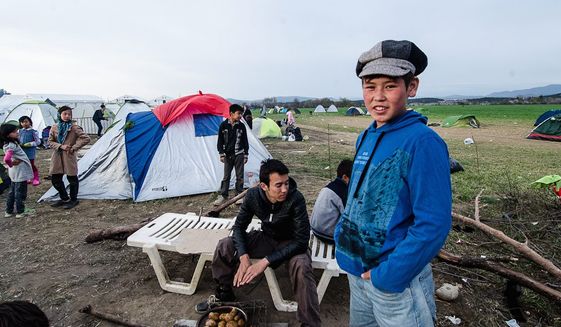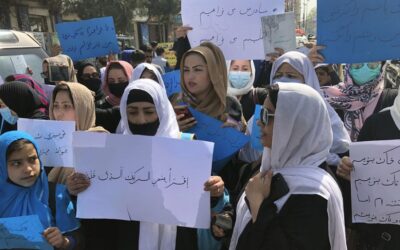April 6, 2016 Washington Times

Photo by: Valerie Plesch Young Afghan refugees are left in limbo on the Greek-Macedonia border, where a makeshift refugee camp is struggling to handle the estimated 14,000 people stranded after Macedonia announced it would close its border with Greece. (Valerie Plesch/Special to the Washington Times)
KABUL, Afghanistan — For the hundreds of Afghans who lined up before sunrise here at Kabul’s only passport office one recent morning, their slow steps were the first of a long, desperate journey out of their war-stricken nation.
One applicant, 30-year-old house painter Hashmatullah Naimi from the neighboring province of Parwan, hoped to join the tens of thousands of Afghans who have already left their homeland in the last year in search of better jobs and a better life in Western Europe, a peril-filled trek that usually takes them through Pakistan, Iran, Turkey and Greece.
“I feel so scared of dying of poverty — there are no more jobs in Afghanistan. I am a house painter, but nowadays no one is asking me to paint their home,” he said while waiting in line with around 350 other applicants. “The economy of the country is breaking down, and people do not want to risk spending their money.”
The lagging economy and rampant corruption, along with a worsening security situation, are threatening Afghanistan’s fledging democracy despite the best efforts and huge investment of the U.S. and its allies, say analysts.
“Insecurity has increased in large parts of the country,” said Arne Strand, an Afghanistan expert in Norway and research director at the Chr. Michelsen Institute, an independent research center on international affairs. “The Taliban has gained strongholds not only in the south but also in the north, which has led them both to higher insecurity but also more migration,”
October 2016 will mark the 15th anniversary of the U.S.-led military invasion in Afghanistan that removed the fundamentalist Taliban from power but created a central government that has proven barely able to hold onto power in Kabul. Since then, two U.S. presidents have overseen the deployment of more than 130,000 American and U.S.-led coalition troops to the battlefields for a war that has cost American taxpayers more than $1 trillion.
Despite those efforts, Afghans don’t want to stay.
Stuck near the finish line
More than 3,000 miles away from Kabul’s passport office, the Afghans who made it out congregate among the thousands stranded in the makeshift camps in the northern Greek village of Idomeni. They’re stuck because the Macedonian government recently closed its doors to all refugees, creating the bottleneck.
Here they are among the estimated 14,000 refugees stranded in Idomeni who fled conflicts in Syria and elsewhere this year along the so-called “Balkan Route” that runs through Greece, Macedonia, Serbia and other nations before it ends in Central Europe.
Last year more than 1 million refugees attempted to enter Europe. Around 178,000 Afghans applied for asylum in Europe last year, according to Eurostat. Many won’t be allowed to stay. The European Union has reportedly drafted a plan that would send 80,000 Afghans back to Afghanistan. The Afghan government says it is unable to accommodate and ensure the safety of those returning.
This year Afghans represent 26 percent, or roughly 37,000, of the total Mediterranean Sea arrivals to Europe, making them the second-highest group after Syrians, according to the U.N.
One Afghan at the Greek camp, Zalmai Rahimi, 32, speaks with an American accent owing to his 11 years working with the U.S. Army. He abandoned a thriving carpet and jewelry business when he left for the West. After spending close to $11,000 to escape Afghanistan with the help of smugglers, he now shares a tent with his wife and three sons on a muddy Greek field.
“I had a good home — everything was good for me, the only problem I had was working for the Americans,” he said about his life in the western city of Herat.
Taliban militants often threatened him and his family, said Mr. Rahimi. A few years ago he applied for a special visa issued by the U.S. government to Afghans who worked with the American military. In his pocket he still kept an apparently legitimate recommendation letter from the American military. But he claimed the American Embassy in Kabul never responded to his application.
“Before it was just the Taliban in Afghanistan, now Daesh is there,” he said, using the alternate name for the Syria-based jihadi Islamic State movement that has recently moved into Afghanistan. “It’s a big problem for the Afghan people.”
Rising civilian casualties
Last year saw the highest recorded number of Afghan civilian casualties since the beginning of the war in 2001 — a total of more than 11,000 deaths and injuries, according to a recent U.N. survey. Areas of the country that were once deemed safe are now wracked by violence as the Taliban test the weak, faction-ridden government in Kabul.
But some experts argue that other problems besides security are holding back Afghanistan.
“It’s not really a military issue,” said Mr. Strand. “It’s just as much a lack of governance. It’s a lack of trust in the government in Kabul.”
In 2014, after highly contested elections, the Obama administration and other governments brokered a power-sharing agreement between President Ashraf Ghani and the government’s chief executive, Abdullah Abdullah. But Mr. Abdullah’s allies in parliament have blocked Mr. Ghani’s nominations for key government positions, including defense minister, a position that has been vacant since the agreement was signed.
In addition to a weak government, Kabul relies on international donors to fund services for its 32.5 million people. The country received around $16 billion in international aid for 2014 through 2017. Those funds could dry up soon, however, giving more Afghans a reason to leave.
“There is a fear that by 2017 the international donors will not necessarily continue the funding at the same level as today,” Mr. Strand said.




0 Comments